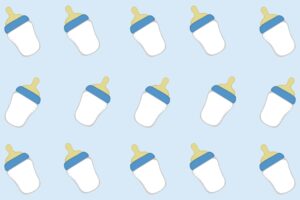Antibodies in Breast Milk


When babies are first born they have an under-developed immune system; this means they are slightly more susceptible to infection with bacteria or viruses. During his or her time in the womb, the mother’s antibodies pass to the baby through the placenta, ensuring that from birth they do have some protection. The levels of maternal antibodies fall over the baby’s first few months of life, as they start developing their own fully functional immune system.
Breast milk and IgA
In addition to all the other benefits that breastfeeding provides, breast milk is a rich source of antibodies and, as such, is a great way of enhancing the baby’s immature immune system.
Breast milk is rich in Immunoglobulin A (IgA). Normally, levels of this antibody increase in response to exposure to infectious agents. The presence of this antibody in breast milk confers protection to the baby without the need to expose them to harmful pathogens. IgA is thought to play a particularly important role in protecting the newborn’s respiratory and gastrointestinal tracts from infection. The secretory form of the antibody will not be broken down (proteolysed) by the cells of the digestive or respiratory systems. Instead, it attaches to the lining of both tracts, neutralises infectious agents and limits the damaging effects of tissue inflammation.
This enhanced protection is of particular importance for premature infants, who are at greater risk of developing infections than babies born at term. Prolonged NICU stays can also increase the risk of hospital-acquired infections. It is imperative that mothers who deliver high risk babies receive adequate support in how to provide their babies with nutrient-rich, antibody-rich breast milk.
Some mothers worry about breastfeeding if they are unwell themselves. In fact, this is a great opportunity to further boost the baby’s developing immune system, as all the antibodies that the mother is producing to fight her infection, will be passed directly to her child through the breast milk she produces.
Long-term immunological impact
It remains unclear whether exposure to the mother’s antibodies through breast milk, has lifelong health implications. There is some evidence that breastfed infants are less likely to develop inflammatory bowel disease or insulin-dependent diabetes mellitus (type 1 diabetes) in later life, than those babies given formula. However, the data would benefit from further validation studies.
Certainly, there is growing interest in the developing gut microbiome of newborns, which varies significantly between breastfed and formula fed infants; with the latter more likely to develop allergies, eczema and atopic dermatitis than those who are exclusively breastfed.
Sources:
- Erliana, Ummu D., and Alyce D. Fly. “The Function and Alteration of Immunological Properties in Human Milk of Obese Mothers.” Nutrients, vol. 11, no. 6, 6 June 2019, p. 1284., doi:10.3390/nu11061284.
- Hanson, L A, and T Söderström. “Human Milk: Defense against Infection.” Progress in Clinical and Biological Research, vol. 61, 1981, pp. 147–159.
- Jackson, K M, and A M Nazar. “Breastfeeding, the Immune Response, and Long-Term Health.” The Journal of the American Osteopathic Association, vol. 106, no. 4, Apr. 2006, pp. 203–207.










































